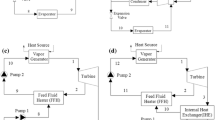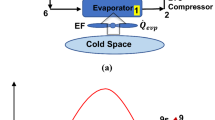Abstract
A new power and refrigeration cycle is examined in the present study. The system proposed is a combination of organic Rankine cycle (ORC) and an ejector refrigeration cycle (ERC). An ERC is introduced into the ORC to recover heat from partial expansion of the ORC fluid. The heat recovery is enhanced with the incorporation of recuperator, evaporator and superheater as heat exchangers. Among the various working fluids opted for, R245fa and R236ea have been considered in the present work. The properties of the combined cycle state points are evaluated through Engineering Equation Solver (EES) software. The impact of decision variables (such as hot source temperature, turbine expansion ratio, extraction ratio, and separator temperature) on performance parameters (such as exergy destruction, energy efficiency of power generation, exergy efficiency of power generation, energy efficiency of combined system, exergy efficiency of combined system, COP, and cooling power ratio) is examined and reported. The series heater configuration in ORC has improved system performance by recovering waste heat more effectively. At the same parametric conditions, the energy and exergy performances of R245fa are higher than those of R236ea.












Similar content being viewed by others
Abbreviations
- m:
-
Mass flow rate (kg s−1)
- h:
-
Specific enthalpy (kg kJ−1)
- T:
-
Temperature (°C)
- W:
-
Work output (kW)
- G:
-
Generator
- M:
-
Mechanical
- P:
-
Pressure (Bar)
- Q:
-
Heat supplied (kW)
- s:
-
Specific entropy (kJ kg−1 K−1)
- I:
-
Irreversibility (kJ kg−1 K−1)
- ex:
-
Specific exergy (kJ kg−1)
- E:
-
Exergy (kJ)
- Ėx:
-
Exergy rate (kW)
- 0:
-
Environment condition
- X:
-
Cooling-to-net power ratio
- HE:
-
Heat exchanger
- CND:
-
Condenser
- ƞ :
-
Efficiency
- Ɛ:
-
Exergetic efficiency (%)
- P:
-
Pump
- v:
-
Vapour
- l:
-
Liquid
- cwin:
-
Cooling water inlet
- cwout:
-
Cooling water outlet
- D:
-
Destruction
- w:
-
Specific work (kJ kg−1)
- q:
-
Specific heat (kJ kg−1)
References
Chen H, Alzahrani HA, Amin MA, Sun M. Towards sustainable development through the design, multi-aspect analyses, and multi-objective optimization of a novel solar-based multi-generation system. Energy. 2023;267:126507.
Verma A, Kaushik SC, Tyagi SK. Energy and exergy analysis of a novel ejector-absorption combined refrigeration cycle using natural refrigerants. Int J Exergy. 2022;39:142.
Qi S, Wang W, Shen S, Albaker A, Alomar MA, Rizwan A, Pugazhendhi A. Geothermal and solar energy utilization for the development of a sustainable power and cooling production. Process Saf Environ Prot. 2023;172:473–85.
Moon CG, Bansal PK, Jain S. New mass transfer performance data of a cross-flow liquid desiccant dehumidification system. Int J Refrig. 2009;32:524–33.
Dong RE, Zhanguo SU, Mansir IB, Abed AM, Niu X. Energy and exergoeconomic assessments of a renewable hybrid ERC/ORC integrated with solar dryer unit, PEM electrolyzer, and RO desalination subsystem. Process Saf Environ Prot. 2023;171:812–33.
Kaushik SC, Kumar R, Chandra S. Thermal modelling and parametric study of two stage absorption refrigeration and air-conditioning systems. Int J Energy Res. 1985;9:391–402.
Ghorbani S, Deymi-Dashtebayaz M, Dadpour D, Delpisheh M. Parametric study and optimization of a novel geothermal-driven combined cooling, heating, and power (CCHP) system. Energy. 2023;263:126143.
Zhang M, Timoshin A, Al-Ammar EA, Sillanpaa M, Zhang G. Power, cooling, freshwater, and hydrogen production system from a new integrated system working with the zeotropic mixture, using a flash-binary geothermal system. Energy. 2023;263:125959.
Tao J, Wang H, Wang J, Feng C. Exergoeconomic and exergoenvironmental analysis of a novel power and cooling cogeneration system based on organic Rankine cycle and ejector refrigeration cycle. Energies. 2022;15:7945.
Ebadollahi M, Amidpour M, Pourali O, Ghaebi H. Flexibility concept in design of advanced multi-energy carrier systems driven by biogas fuel for sustainable development. Sustain Cities Soc. 2022;86:104121.
Kaushik SC, Arora A. Energy and exergy analysis of single effect and series flow double effect water–lithium bromide absorption refrigeration systems. Int J Refrig. 2009;32:1247–58.
Ahmadi P, Fakhari I, Rosen MA. A comprehensive approach for tri-objective optimization of a novel advanced energy system with gas turbine prime mover, ejector cooling system and multi-effect desalination. Energy. 2022;254:124352.
Ebrahimi A, Ghorbani B, Taghavi M. Novel integrated structure consisting of CO2 capture cycle, heat pump unit, Kalina power, and ejector refrigeration systems for liquid CO2 storage using renewable energies. Energy Sci Eng. 2022;10:3167–88.
Musharavati F, Khanmohammadi S, Mansir IB. Design, exergy analysis, and optimization of a hydrogen generation/storage energy system with solar heliostat fields and absorption-ejector refrigeration system. Int J Hydrogen Energy. 2022;47:25945–63.
Soytürk G, Toker SÇ, Kizilkan Ö. Thermodynamic analysis of ammonia based direct steam generation trigeneration system. El-Cezeri. 2022;9:21–739.
Takleh HR, Zare V, Mohammadkhani F, Sadeghiazad MM. Proposal and thermoeconomic assessment of an efficient booster-assisted CCHP system based on solar-geothermal energy. Energy. 2022;246:123360.
Liu F, Yang C, Li B, Silang Y, Zhu Y, Farkoush SG. Thermodynamic and economic sensitivity analyses of a geothermal-based trigeneration system; performance enhancement through determining the best zeotropic working fluid. Energy. 2022;246:123310.
Mahdavi N, Ghaebi H, Minaei A. Proposal and multi-aspect assessment of a novel solar-based trigeneration system; investigation of zeotropic mixture’s utilization. Appl Therm Eng. 2022;206:118110.
Shi K, Asgari A. Energy, exergy, and exergoeconomic analyses and optimization of a novel thermal and compressed air energy storage integrated with a dual-pressure organic Rankine cycle and ejector refrigeration cycle. J Energy Storage. 2022;47:103610.
Bhowmick A, Kundu B. Extremum analysis based on exergy and economic principle for ejector-absorption cycles combined with regenerative organic-Rankine and gas-turbine cycles. Energy Convers Manag. 2022;253:115174.
Afif L, Bouaziz N. Thermodynamic investigation of a solar energy cogeneration plant using an organic Rankine cycle in supercritical conditions. FDMP Fluid Dyn Mater Process. 2022;18:1243–51.
Cao Y, Dhahad HA, Togun H, Hussen HM, Anqi AE, Farouk N, Issakhov A. Thermodynamic and economic assessments and multi-criteria optimization of a novel poly-generation plant using geothermal energy and multi heat recovery technique. Int J Hydrogen Energy. 2021;46:27851–73.
Tashtoush B, Morosuk T, Chudasama J. Exergy and exergoeconomic analysis of a cogeneration hybrid solar organic rankine cycle with ejector. Entropy. 2020;22:702.
Yu W, Xu Y, Wang H, Ge Z, Wang J, Zhu D, Xia Y. Thermodynamic and thermoeconomic performance analyses and optimization of a novel power and cooling cogeneration system fueled by low-grade waste heat. Appl Therm Eng. 2020;179:115667.
Zandi S, Mofrad KG, Moradifaraj A, Salehi GR. Energy, exergy, exergoeconomic, and exergoenvironmental analyses and multi-objective optimization of a CPC driven solar combined cooling and power cycle with different working fluids. Int J Thermodyn. 2021;24:151–70.
Yu W, Wang H, Ge Z. Comprehensive analysis of a novel power and cooling cogeneration system based on organic Rankine cycle and ejector refrigeration cycle. Energy Convers Manag. 2021;232:113898.
Wang Y, Yu L, Nazir B, Zhang L, Rahmani H. Innovative geothermal-based power and cooling cogeneration system; thermodynamic analysis and optimization. Sustain Energy Technol Assess. 2021;44:101070.
Bhardwaj PK, Kaushik SC, Jain S. General performance characteristics of an irreversible vapour absorption refrigeration system using finite time thermodynamic approach. Int J Therm Sci. 2005;44:189–96.
Kapadia RG, Jain S, Agarwal RS. Transient characteristics of split air-conditioning systems using R-22 and R-410A as refrigerants. HVAC&R Res. 2009;15:617–49.
Wang J, Dai Y, Sun Z. A theoretical study on a novel combined power and ejector refrigeration cycle. Int J Refrig. 2009;32:1186–94.
Mahmoudi SMS, Kordlar MA. A new flexible geothermal based cogeneration system producing power and refrigeration. Renew Energy. 2018;123:499–512.
Barkhordarian O, Behbahaninia A, Bahrampoury R. A novel ammonia-water combined power and refrigeration cycle with two different cooling temperature levels. Energy. 2017;120:816–26.
Du Y, Han P, Qiang X, Hao M, Long Y, Zhao P, Dai Y. Off-design performance analysis of a combined cooling and power system driven by low-grade heat source. Energy Convers Manag. 2018;159:327–41.
Yang X, Zheng N, Zhao L, Deng S, Li H, Yu Z. Analysis of a novel combined power and ejector-refrigeration cycle. Energy Convers Manage. 2016;108:266–74.
Chen X, Su Y, Omer S, Riffat S. Theoretical investigations on combined power and ejector cooling system powered by low-grade energy source. Int J Low-Carbon Technol. 2016;11:466–75.
Acknowledgements
The authors acknowledge the novel system “Integrated organic Rankine cycle power generation and ejector. Refrigeration systems using waste heat recovery from multifuel research engine and a method thereof” application no. 202241004714 A. published as patent. The authors would like to acknowledge the support received from Kingston Engineering College, Vellore, Tamil Nadu, India‐632014, for this research.
Author information
Authors and Affiliations
Corresponding author
Additional information
Publisher's Note
Springer Nature remains neutral with regard to jurisdictional claims in published maps and institutional affiliations.
Rights and permissions
Springer Nature or its licensor (e.g. a society or other partner) holds exclusive rights to this article under a publishing agreement with the author(s) or other rightsholder(s); author self-archiving of the accepted manuscript version of this article is solely governed by the terms of such publishing agreement and applicable law.
About this article
Cite this article
Omprakash, M., Ganesh, N.S. Evaluation of novel power and refrigeration system energy and exergy perspective. J Therm Anal Calorim (2024). https://doi.org/10.1007/s10973-024-13067-x
Received:
Accepted:
Published:
DOI: https://doi.org/10.1007/s10973-024-13067-x




